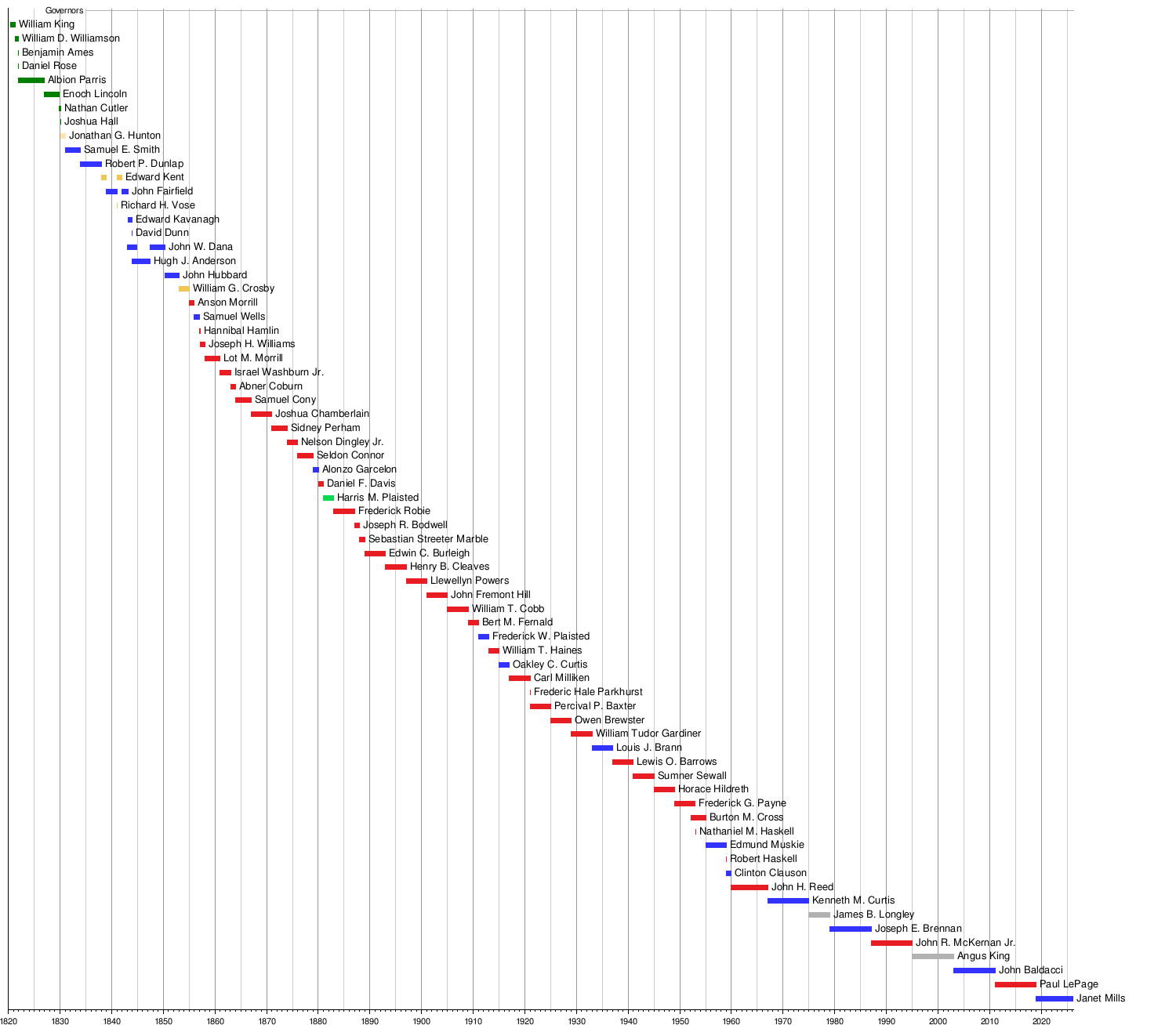Governor of Maine facts for kids
Quick facts for kids Governor of Maine |
|
|---|---|

Seal of the governor
|
|
| Government of Maine | |
| Style | The Honorable |
| Residence | The Blaine House |
| Seat | Augusta, Maine |
| Appointer | Popular vote |
| Term length | 4 years, renewable once consecutively |
| Constituting instrument | Constitution of Maine |
| Precursor | Governor of Massachusetts (District of Maine) |
| Inaugural holder | William King |
| Formation | March 15, 1820 |
| Succession | Line of succession |
| Salary | $70,000 (2022) |
The Governor of Maine is the leader of the state government in Maine, a state in the United States. Think of them as the chief executive, like a president for the state. Before Maine became its own state in 1820, it was part of Massachusetts. At that time, the governor of Massachusetts was in charge.
The current Governor of Maine is Janet Mills. She is a member of the Democratic Party. Governor Mills started her term on January 2, 2019.
As of 2025, the Governor of Maine earns a salary of $70,000 per year. This is the lowest salary among all 50 state governors. However, a new law passed in 2025 will increase the governor's salary to $125,000. This change will happen when a new governor takes office in 2026. The Maine Constitution does not allow changing the salary of a governor who is already in office.
Contents
Becoming Governor: Rules and Elections
Who Can Be Governor?
To become the Governor of Maine, a person must meet certain requirements. These rules are found in the state's constitution.
- They must be at least 30 years old when they start the job.
- They must have been a citizen of the United States for 15 years.
- They must have lived in Maine for at least five years.
- The governor must continue to live in Maine while in office.
- A person cannot be governor if they hold another job for the United States, Maine, or any other government.
How Governors Are Elected
Governors in Maine are chosen by the people through an election. They serve for four years. A governor can be elected many times, but they can only serve two terms in a row. For example, if someone serves two terms, they must wait before running again.
If two people get the same number of votes in an election, the state Legislature decides who becomes governor. They meet together to make this choice.
The first Maine Constitution in 1820 said governors would serve for only one year. This term started in January. Later, the rules changed. In 1879, the term became two years. In 1957, it changed to four years. The 1957 change also added the rule about not serving more than two terms in a row.
What the Governor Does
Governor's Main Powers
The governor has many important jobs and powers.
- They are the commander-in-chief of Maine's military forces. This includes the Maine National Guard. However, this is only when the National Guard is not working for the federal government.
- The governor usually chooses people for important state jobs. These include civil, military, and court officials. The Legislature must approve these choices.
- The governor can also grant pardons. A pardon means someone is forgiven for a crime. They can also give reprieves, which delay punishments. Commutations reduce a punishment. These powers do not apply if someone has been impeached. The governor can also use these powers for young people who have committed offenses.
The Governor's Team: The Cabinet
The governor leads the executive branch of Maine's government. This branch includes all the state agencies. The governor's main team is called the Cabinet. The Cabinet is made up of the state's commissioners. These commissioners are usually suggested by the governor. However, the Maine Legislature officially chooses them.
Current Cabinet Members
| Office | Name | Since |
|---|---|---|
| Governor | Janet Mills | 2019 |
| Commissioner of the Department of Administrative & Financial Services | Kirsten Figueroa | 2019 |
| Commissioner of the Department of Agriculture, Conservation and Forestry | Amanda Beal | 2019 |
| Commissioner of the Department of Corrections | Randall Liberty | 2019 |
| Commissioner of the Department of Defense, Veterans and Emergency Management | Douglas Farnham | 2016 |
| Commissioner of the Department of Economic and Community Development | Heather Johnson | 2019 |
| Commissioner of the Department of Education | Pender Makin | 2019 |
| Commissioner of the Department of Environmental Protection | Melanie Loyzim | 2021 |
| Commissioner of the Department of Health & Human Services | Jeanne Lambrew | 2019 |
| Commissioner of the Department of Inland Fisheries & Wildlife | Judy Camuso | 2019 |
| Commissioner of the Department of Marine Resources | Patrick C. Keliher | 2012 |
| Commissioner of the Department of Public Safety | Michael Sauschuck | 2019 |
| Commissioner of the Department of Transportation | Bruce Van Note | 2019 |
| Commissioner of the Department of Labor | Laura Fortman | 2019 |
| Commissioner of the Department of Professional & Financial Regulation | Anne Head | 2008 |
| Executive Director of Workers' Compensation Board | John Rohde | 2019 |
Who Takes Over if the Governor Can't Serve?
Maine is one of five states that does not have a lieutenant governor. A lieutenant governor usually takes over if the governor cannot do their job. In Maine, if the governor's office becomes empty, the president of the Maine Senate becomes the new governor. As of late 2024, the Senate president is Democrat Mattie Daughtry.
The Governor's Home: The Blaine House
The The Blaine House is the official home for the Governor of Maine. It is located in Augusta, the state capital. The house is right across the street from the Maine State House, where the Legislature meets.
The Blaine House became the official residence in 1919. It is named after James G. Blaine, a famous politician who once owned the house. Captain James Hall built the house in 1833. In 1964, it was recognized as a National Historic Landmark. This means it is a very important historical place.
Past Governors of Maine
Timeline of Governors
| Timeline of Maine governors |
 |
 | Jessica Watkins |
 | Robert Henry Lawrence Jr. |
 | Mae Jemison |
 | Sian Proctor |
 | Guion Bluford |


